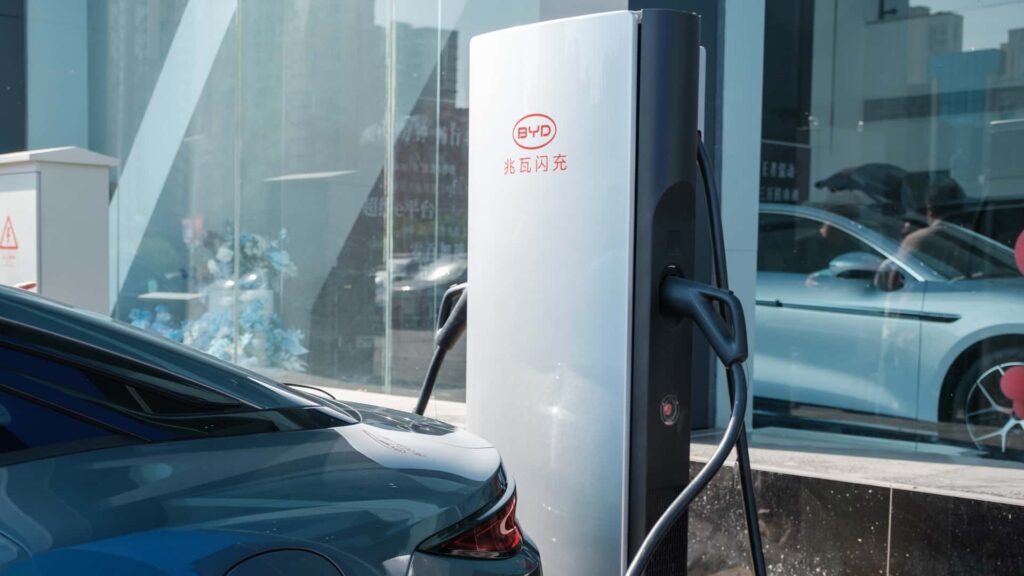BYD, a leading Chinese EV charging company, has recently announced a partnership with two Chinese charging powerhouses, Xiaoju Charging and LongShine, to deploy 15,000 1,000-kilowatt (1-MW) EV chargers in China. This move comes after BYD’s successful launch of two models capable of charging at that rate, with plans to introduce more models in the near future.
Currently, BYD has over 500 1-MW chargers operational in key urban centers across China. However, with the new partnership agreements, the company aims to significantly expand its charging network. Xiaoju Charging has committed to building or upgrading 10,000 charging points to 1 MW, while LongShine has pledged an additional 5,000 chargers. BYD will provide energy storage solutions to support 1 MW charging in areas where the existing electricity grid may not be able to meet the demand.
The high-speed charging capability is currently only compatible with cars built on BYD’s new Super e-Platform 2.0. The Han L sedan and Tang L SUV are the first models to support 1 MW charging, and both have seen strong sales since their launch in April. Drivers in China have shown a keen interest in ultra-fast charging, with over 10,000 units of each model sold within the first month.
Competitors in the Chinese EV market are also ramping up their efforts to develop high-speed charging solutions. Xpeng has already deployed 480-kW rapid chargers and aims to reach 800 kW with its next generation of chargers. GAC Aion offers 6C chargers, capable of charging at six times the battery pack’s capacity. Zeekr, a Geely-backed automaker, is working on a 1.2 MW charger, while Huawei is pushing the boundaries with plans for a 1.5 MW charger.
Overall, the race for ultra-fast charging solutions in China is heating up, with BYD leading the charge with its ambitious plans to deploy thousands of 1-MW chargers across the country. As the demand for electric vehicles continues to grow, infrastructure development is crucial to support the widespread adoption of EVs and ensure a seamless charging experience for drivers. BYD is setting itself apart from the competition when it comes to high-speed charging for electric vehicles. While other companies may be talking about their plans for fast charging, BYD already has hundreds of high-speed charging stations in operation and thousands more on the way. What’s more impressive is that BYD’s electric vehicles are actually capable of utilizing all that charging power.
The key point here is that BYD is not just talking the talk, they are walking the walk. With a considerable lead in the number of operational high-speed charging stations, BYD is ahead of the game when it comes to providing convenient and efficient charging solutions for electric vehicle owners.
In a market where speed and convenience are key factors for consumers, BYD’s focus on high-speed charging infrastructure gives them a competitive edge. As more and more electric vehicles hit the road, the demand for fast and reliable charging options will only continue to grow. BYD’s commitment to expanding their network of high-speed charging stations shows that they are serious about meeting the needs of electric vehicle owners.
With the integration of BYD’s high-speed charging stations into the market, electric vehicle owners can rest assured that they will have access to fast and efficient charging options wherever they go. This will not only make electric vehicles more practical for everyday use, but it will also help to alleviate concerns about range anxiety.
Overall, BYD’s lead in high-speed charging infrastructure is a testament to their dedication to providing innovative solutions for the electric vehicle market. As the demand for electric vehicles continues to rise, having a reliable and extensive network of high-speed charging stations will be crucial for the widespread adoption of electric vehicles. With BYD leading the way, the future of electric transportation is looking brighter than ever.

